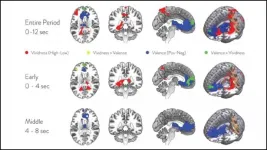(Press-News.org) May 17, 2021 - Amid the rising toll of opioid overdoses and deaths in the U.S., several states are considering laws enabling civil commitment for involuntary treatment of patients with substance use disorders (SUDs). Most addiction medicine physicians support civil commitment for SUD treatment - but others strongly oppose this approach, reports a survey study in Journal of Addiction Medicine, the official journal of the American Society of Addiction Medicine (ASAM). The journal is published in the Lippincott portfolio by Wolters Kluwer.
"Civil commitment has emerged as a sometimes compelling yet controversial policy option," according to the new study, led by Abhishek Jain, MD. At the time of the study, Dr. Jain was at Columbia University and New York State Psychiatric Institute. The report is accompanied by a pair of expert commentaries: one discussing the idea of civil commitment in a historical context and another highlighting the dangers of coercive treatment and patient harm.
Physician specialists agree: more education and research needed on civil commitment for SUDs
Most states already have legislation providing for civil commitment of patients with SUDs. "These laws create a mechanism for family members, healthcare practitioners, or select others to seek involuntary court-mandated treatment for individuals suffering from addiction," according to the authors. The opioid crisis has spurred many states to adopt new or expand existing laws, or to implement them more widely.
However, there is little evidence for either beneficial or harmful effects of civil commitment for SUD treatment. To assess the views of addiction medicine physician specialists, Dr. Jain and coauthors sent an online survey to 1,451 members of the ASAM. The analysis included responses from 165 physicians, a rate of 11.4 percent.
Overall, 60.7 percent of the addiction medicine specialists favored civil commitment with involuntary treatment of SUDs. Another 21.5 percent of physicians were opposed to civil commitment for SUDs, while 17.8 percent were unsure. About half of respondents said they would likely consider using civil commitment laws if available in their state, while more than one-third said they were not familiar with such laws.
Nearly 80 percent of respondents believed civil commitment should be permitted for patients who used heroin, while about 75 percent thought it would be appropriate for those who used alcohol or opioids other than heroin. Sixteen percent opposed civil commitment for any type of SUD.
Most respondents believed that medications and behavioral therapies - as well as resources to pay for treatment - would be essential for civil commitment laws to be effective. By large majorities, the specialists agreed on the need for more education and research.
Those who opposed civil commitment were more likely to say it would "jeopardize patient rapport" and would be ineffective for unmotivated patients. Whether they favored or opposed civil commitment, addiction medicine specialists agreed on the need for an efficient legal system, available secure treatment facilities, clear consequences for patients who don't follow treatment plans, and ongoing aftercare.
A commentary by William F. Haning III, MD, of the University of Hawai'i at Manoa, Honolulu, discusses reasons for the diverging views of addiction medicine specialists and highlights critical questions for further research: particularly the criteria for civil commitment and the effectiveness of compulsory treatment. He emphasizes the need for "a wider range of supervisory and custodial changes," based on evidence-based approaches.
In another commentary, John C. Messinger, BS, of Harvard Medical School and Leo Beletsky, JD, MPH, of Northeastern University, Boston, call on addiction care providers to "challenge the use of state power to coerce people into treatment settings - especially when such settings often diverge from best clinical practices." They conclude: "Addiction professionals must reject perpetuating punitive structures that harm the individuals we are hoping to serve."
INFORMATION:
Click here to read "Civil Commitment for Substance Use Disorders: A National Survey of Addiction Medicine Physicians."
DOI: 10.1097/ADM.0000000000000847
About Journal of Addiction Medicine
The mission of Journal of Addiction Medicine, the official journal of the American Society of Addiction Medicine, is to promote excellence in the practice of addiction medicine and in clinical research as well as to support Addiction Medicine as a mainstream medical specialty. Published six times a year, the Journal is designed for all physicians and other mental health professionals who need to keep up-to-date with the treatment of addiction. Under the guidance of an esteemed Editorial Board, peer-reviewed articles published in the Journal focus on developments in addiction medicine as well as on treatment innovations and ethical, economic, forensic, and social topics. Visit us on the web at http://www.JournalAddictionMedicine.com.
About The American Society of Addiction Medicine
The American Society of Addiction Medicine (ASAM) is a professional society representing more than 6000 physicians, clinicians, and associated professionals in the field of addiction medicine. ASAM is dedicated to increasing access and improving the quality of addiction treatment, educating physicians and the public, supporting research and prevention, and promoting the appropriate role of physicians in the care of patients with addiction. Visit us on the web at http://www.ASAM.org; follow @ASAMorg on Twitter.
About Wolters Kluwer
Wolters Kluwer (WKL) is a global leader in professional information, software solutions, and services for the clinicians, nurses, accountants, lawyers, and tax, finance, audit, risk, compliance, and regulatory sectors. We help our customers make critical decisions every day by providing expert solutions that combine deep domain knowledge with advanced technology and services.
Wolters Kluwer reported 2020 annual revenues of €4.6 billion. The group serves customers in over 180 countries, maintains operations in over 40 countries, and employs approximately 19,200 people worldwide. The company is headquartered in Alphen aan den Rijn, the Netherlands.
Wolters Kluwer provides trusted clinical technology and evidence-based solutions that engage clinicians, patients, researchers and students in effective decision-making and outcomes across healthcare. We support clinical effectiveness, learning and research, clinical surveillance and compliance, as well as data solutions. For more information about our solutions, visit https://www.wolterskluwer.com/en/health and follow us on LinkedIn and Twitter @WKHealth.
For more information, visit http://www.wolterskluwer.com, follow us on Twitter, Facebook, LinkedIn, and YouTube.
Some 16 million Americans are believed to have alcohol use disorder, and an estimated 93,000 people in the U.S. die from alcohol-related causes each year. Both of those numbers are expected to grow as a result of heavier drinking during the COVID-19 pandemic.
Yet, in a new study involving data from more than 200,000 people with and without alcohol problems, researchers at Washington University School of Medicine in St. Louis found that although the vast majority of those with alcohol use disorder see their doctors regularly for a range of issues, fewer than one in 10 ever get treatment for drinking.
The findings are published in the June issue of the journal Alcoholism: Clinical & Experimental Research.
Analyzing data gathered from 2015 through 2019 via the National ...
In a world that's changing fast, the Long Term Ecological Research (LTER) Network can seem almost an anachronism. Yet the patience and persistence that have generated 40 years of careful, reliable science about the Earth's changing ecosystems may prove to be just what's needed in this rapidly shifting world. We can't wait for a crystal ball -- and we don't have to. By harnessing decades of rich data, scientists are beginning to forecast future conditions and plan ways to manage, mitigate, or adapt to likely changes in ecosystems that will impact human economies, health and wellbeing.
The National Science Foundation established the LTER Network more than 40 years ago to provide an alternative to funding models that favored constant innovation over continuity. The model has proven to be extraordinarily ...
An international study has found that four out of five women in prison in Scotland have a history of head injury, mostly sustained through domestic violence. Published recently in The Lancet, researchers, including SFU psychology graduate student Hira Aslam, say the study has important implications for the female prison population more broadly and could help to inform mental health and criminal justice policy development.
"The findings are incredibly sobering," says Aslam. "While we anticipated that the incidence of head injuries among women who are involved in the criminal justice system would be high, these estimates exceeded our expectations."
Researchers also found that violent criminal behaviour was three times more likely among women who had a history of significant head injury, ...
ATS 2021, New York, NY - Air quality standards recommended by the American Thoracic Society (ATS) have the potential to prevent more illness and death than standards adopted by the U.S. Environmental Protection Agency (EPA), according to research presented at the ATS 2021 International Conference.
Laura Gladson, MS, a research scholar with the Air Quality Program at the Marron Institute of Urban Management, New York University (NYU) and colleagues from NYU and the ATS assessed differences between the potential public health protections provided by EPA air quality standards and the more stringent standards proposed by the ATS. Comparing real-world ...
Two components of imagination -- constructing and evaluating imagined scenarios -- rely on separate subnetworks in the default mode network, according to research recently published in JNeurosci.
Even when you aren't doing anything, your brain is hard at work. The default mode network (DMN) activates during the brain's resting state and has been linked to daydreaming, planning, and imagining the future. In previous studies, scientists noticed the DMN could be divided into two subnetworks, ventral and dorsal, but their different roles were debated.
Lee et al. used fMRI to measure participants' brain activity while they imagined scenarios listed on prompts, like "Imagine you win the lottery." The scenarios ...
KINGSTON, R.I. - May 17, 2021 - An article recently published in the prestigious journal Nature Communications, written by University of Rhode Island END ...
Clinicians and surgeons are increasingly using medical devices based on artificial intelligence. These AI devices, which rely on data-driven algorithms to inform health care decisions, presently aid in diagnosing cancers, heart conditions and diseases of the eye, with many more applications on the way.
Given this surge in AI, two Stanford University faculty members are calling for efforts to ensure that this technology does not exacerbate existing heath care disparities.
In a new perspective paper, Stanford faculty discuss sex, gender and race bias in medicine and how these biases could be perpetuated by AI devices. The authors suggest several short- and long-term approaches to prevent AI-related ...
BOSTON - Peripheral artery disease (PAD), or blockages in the arteries outside of the heart, affects more than 200 million people worldwide and 12.5 million people in the United States. Patients with this circulatory disorder may develop severe leg pain or unhealing wounds that require a minimally invasive revascularization procedure to open the blood vessels to improve blood flow.
For nearly a decade, proceduralists and surgeons have depended on devices coated with a drug called paclitaxel -- which reduces the need for another procedure by up to 50 percent -- during procedures to open the arteries of the leg. However, in the wake of a 2018 study that found a potential link between ...
COLUMBUS, Ohio - Up to 38.6% of people with colon cancer who have a hereditary cancer syndrome--including 6.3% of those with Lynch syndrome--could have their conditions remain undetected with current universal tumor-screening methods, and at least 7.1% of people with colorectal cancer have an identifiable inherited genetic mutation, according to new data published by scientists at The Ohio State University Comprehensive Cancer Center - Arthur G. James Cancer Hospital and Richard J. Solove Research Institute (OSUCCC - James).
Experts say their data, which was gathered from a cohort of more than 3,300 colorectal cancer patients treated at 51 hospitals across Ohio, makes a strong scientific argument for implementing multi-gene panel ...
A team of Welsh academics has developed a new method of supporting health professionals to make clinical decisions about people who may be at risk of taking their own lives.
While the UK may have one of the lowest rates of suicide in the world, it is still the biggest cause of death in men under 45, so being able to make a Structured Professional Judgement about who might attempt suicide and knowing how to intervene is vitally important.
Researchers at Swansea and Cardiff universities have put together the Risk of Suicide Protocol (RoSP) which guides a professional to look at 20 aspects of a person's life known ...



